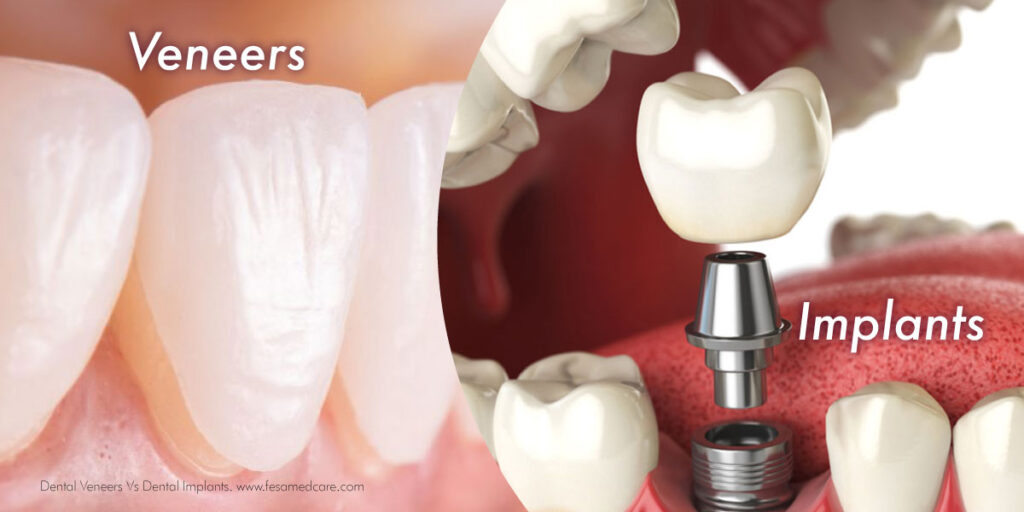How to Choose a Board-Certified Specialist in Colombia Plastic Surgery,...
Dental Implants Vs Veneers : Exploring the Differences and Benefits
Dental implants vs Veneers. When it comes to enhancing one’s smile and overall oral health, veneers and dental implants are two popular options. Both provide solutions for different dental concerns, but they have distinct differences and unique benefits. In this article, we will delve into the contrasts and advantages of veneers and dental implants to help you make an informed decision regarding your dental needs.

Differences
1. Nature of Treatment:
Veneers: Veneers are thin shells, usually made of porcelain, custom-designed to fit over the front surface of existing teeth. This treatment is primarily cosmetic, improving the appearance of teeth by addressing issues like discoloration, minor misalignment, or uneven shapes.
Dental Implants: Dental implants involve surgically placing metal posts (usually titanium) into the jawbone to act as artificial tooth roots. These posts support prosthetic teeth and serve as a strong foundation for a replacement tooth or a set of teeth. Dental implants are both cosmetic and functional, providing a permanent solution for missing teeth.
2. Purpose and Indications:
Veneers: Veneers are suitable for individuals with healthy teeth but aesthetic concerns, such as staining, small gaps, or slightly misaligned teeth. They are an excellent choice for enhancing the look of the smile while maintaining the natural tooth structure.
Dental Implants: Dental implants are recommended for individuals with missing teeth due to injury, decay, or other dental issues. They are ideal for restoring the functionality and appearance of missing teeth.
3. Invasiveness and Procedure Complexity:
Veneers: Applying veneers involves minimal alteration of the natural teeth. The process typically includes removing a small amount of enamel to accommodate the veneer’s thickness and then bonding the veneer to the tooth.
Dental Implants: Dental implant placement is a surgical procedure, requiring the implantation of a metal post into the jawbone. The process involves multiple steps, including surgery, healing time, and placement of the prosthetic tooth.
4. Cost:
Veneers: Veneers are generally more affordable than dental implants. The cost of veneers can vary based on the material used, the dentist’s expertise, and the number of teeth requiring treatment.
Dental Implants: Dental implants tend to be more expensive due to the surgical nature of the procedure, the materials used, and the overall complexity of the treatment.
Benefits
Benefits of Veneers
Improved Aesthetics: Veneers enhance the appearance of teeth by addressing issues like discoloration, stains, and irregular shapes. They provide a natural-looking, aesthetically pleasing smile.
Conservative Approach: Veneer placement is minimally invasive, preserving a significant portion of the natural tooth structure while achieving the desired cosmetic enhancement.
Stain Resistance: Porcelain veneers are highly resistant to stains, ensuring a long-lasting bright smile even with regular consumption of stain-causing foods and beverages.
Fast Results: Veneers can transform a smile in a relatively short period, often requiring only a few visits to the dentist for consultation, preparation, and bonding.
Benefits of Dental Implants
Natural Feel and Functionality: Dental implants closely resemble natural teeth in both appearance and functionality, providing a comfortable and seamless chewing and speaking experience.
Permanent Solution: Unlike other tooth replacement options, dental implants are a permanent solution. With proper care, they can last a lifetime, making them a worthwhile long-term investment.
Preservation of Jawbone and Facial Structure: Implants help maintain the integrity of the jawbone and facial structure by stimulating bone growth and preventing bone loss, which is common after tooth loss.
Improved Confidence and Quality of Life: Dental implants restore self-confidence by giving individuals the ability to smile, eat, and speak confidently without worrying about their teeth slipping or causing discomfort.
Conclusion
In conclusion, both veneers and dental implants offer unique advantages tailored to specific dental needs. Veneers are ideal for cosmetic enhancements, providing a quick and minimally invasive solution for improving the appearance of teeth. On the other hand, dental implants offer a permanent and functional solution for missing teeth, restoring not only aesthetics but also oral health and quality of life. The choice between the two depends on individual preferences, budget, and the specific dental concerns that need to be addressed. It’s advisable to consult with a dental professional to determine the most suitable treatment plan for your unique circumstances.
Choose the right Dentist with www.fesamedcare.com
Why You May Need a Gastric Sleeve Before Plastic Surgery
Why You May Need a Gastric Sleeve Before Plastic Surgery...
Why You Shouldn’t Delay Your Root Canal
Why You Shouldn’t Delay Your Root Canal What Patients Really...
Stem Cells in Colombia
Stem Cells in Colombia Stem cell therapy and regenerative medicine...




